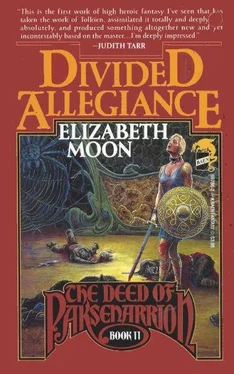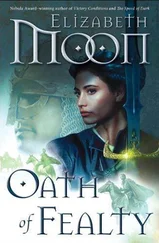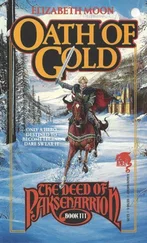Elizabeth Moon
Divided Allegiance
Long ago, before the elder folk were driven from the lands south of the Hakkenarsk, the elves who dwelt in those heights had found a valley more lovely than any other. The shape of its rock and the clarity of its water brought joy to all who saw it. There for a time the elves lived, and built as they rarely build, while the greatest among them sang to the taig of that place, and wakened it to its own power. Over long years they shaped it, singing one song of beauty after another, and the taig responded, willing itself to flourish as the elves suggested. Very dear was this valley to all who could sense the taigin, both elder and younger folk, and it was known as the elfane taig , the holy place and a living banner of the elves and their powers.
Then troubles came: the tales are lost that tell who brought them, or how those who fled sought refuge far away. Even to the elfane taig the evil came, and the elves fled, driven out by a power they could not resist for all their songs. The taig remained, crippled in its resistance to that evil by corruption placed at its heart, no longer truly elfane but banast , or wounded. Most of its great strength was spent in containing that corruption. The taig could not attack the embodied evil without loosing the worse danger, the periapt which would leave it permanently defiled.
Few travelers went that way at first, for its hazards were well known. The elves, when they were asked, warned all. No dwarf would venture so near the Ladysforest, and humans, for the most part, preferred the easier pass at Valdaire, or the shorter one over Dwarfwatch. So for long years the contending powers in the valley had only each other to feed on. A stray orc here, a wolfpack there—these nourished the conflict ill. And of the travelers that passed, not all were apt for use. Some, when the visions came, woke quickly and fled, leaving packs and animals behind. Others, greedy for treasure, stormed into the ruins without sense, and fell to the first of the traps and creatures, ending as servants of evil, or its food.
But ages passed, and time dulled human memories, and every the contending powers sought lives and souls to serve them, to war in their long and bitter strife. As elven influence waned in Lyonya, the nearest settled land, few asked elves for advice; fewer still obeyed. Bold explorers, half brigand, wandered the northern slopes. From time to time an entire band disappeared below the valley’s ruins, to live in the eternal light of the old halls, and fight for whichever power could enchant each separate soul. There they died, for none came alive from the banast taig. So the treasure accumulated, over the years: most of it the weaponry and armor of wandering mercenaries or brigands, but also odd bits of magical equipment, scholars’ scrolls—whatever a lost traveler might be carrying.
Then two more travelers entered the valley.
When all Siniava’s troops had surrendered, Kieri Phelan’s troops assumed they’d be going back to Valdaire—even, perhaps, to the north again. Some already had plans for spending their share of the loot. Others looked forward to time to rest and recover from wounds. Instead, a few days later they found themselves marching south along the Immer in company with Alured’s men, the Halverics, and several cohorts of the Duke of Fall’s army. These last looked fresh as new paint, hardly having fought at all, except to turn Siniava away from Fallo.
“I don’t understand it,” muttered Keri to Paks as they marched. “I thought we were through. Siniava’s dead. What more?”
Paks shook her head. “Maybe the Duke has a contract; he’s spent a lot on this campaign.”
“Contract! Tir’s bones, it’ll take us the rest of the season just to get back to Valdaire. Why do we need a contract?”
That was a first-year’s innocence. Paks grinned at him. “Money,” she said. “Or were you going to forget about pay?”
Seli winked at Paks, a veteran’s knowing wink, and said, “Have you ever seen the sea?”
“No—why?” Keri looked stubborn; sweat dripped off his nose.
“Well, that’s reason enough to go south. I’ve seen it—you’ll be impressed.”
“What’s it like?” asked Paks when Keri’s expression didn’t change.
“I don’t think anyone can tell you. You have to see it.”
Word soon trickled down from the captains that Alured was claiming the title of Duke of Immer. This meant nothing to Paks or the younger soldiers, but Stammel knew that the title had been extinct since the fall of the old kingdom of Aare across the sea.
“I’m surprised that the Duke of Fall and the other nobles are accepting it,” he said.
“That was the price of his help this year,” said Vossik. All the sergeants had gathered around one fire for an hour or so. “I heard talk in Fallo’s cohorts about it. If Fallo, Andressat, and Cilwan would uphold his claim—and our Duke, of course—then he’d turn on Siniava.”
“But why would they, even so?”
“It’s an odd story,” said Vossik, obviously ready to tell it.
“Go on, Voss, don’t make us beg,” growled Stammel.
“Well, it’s only what I heard, after all. I don’t know whether those Fallo troops know the truth, or if they’re telling it, but here it is. It seems that Alured used to be a pirate on the Immerhoft—”
“We knew that—”
“Yes, but that’s the beginning. He’d captured another ship, and was about to throw the prisoners over, the way pirates do—”
“Into the water?” asked Paks.
Someone laughed. Vossik turned to her. “Pirates don’t want a mess on their ships—so they throw prisoners overboard—”
“But don’t they swim or wade to shore?” asked Natzlin.
“They can’t. It’s too far, and the water is deep.”
“I can swim a long way—” said Barra. Paks grinned to herself. Barra always thought she could do more than anyone else.
“Not that far. Tir’s gut, Barra, you haven’t seen the sea yet. It could be a day’s march from shore, the ship, when they toss someone out.” Vossik took a long swallow of sib, and went on. “Anyway, one of the prisoners said he was a mage. He cried out that Alured should be a prince, and he—the mage—could help him.”
“I’d have thought Alured wouldn’t listen to prisoners’ yells,” said Stammel. “He doesn’t look the type.”
“No,” agreed Vossik. “He doesn’t. But it seems he’d had some sort of tale from his father—about being born of good blood, or whatever. So he listened, and the mage told him he was really heir to a vast kingdom, wasting his time as a pirate.”
“He believed that?” Haben snorted and reached his own mug into the sib. “I’d heard pirates were superstitious, but—”
“Well, the man offered proof. Said he’d seen scrolls in old Aare that proved it. Offered to take Alured there, and prove his right to the kingdom.”
“To Aare? That heap of sand?”
“How do you know, Devlin? You haven’t been there.”
“No, but I’ve heard. Nothing’s left but scattered ruins and sand. It’s in the songs.” He hummed a phrase of “Fair Were the Towers.”
Vossik shrugged. “Alured didn’t ask you . The mage told Alured that he’d seen proof of Alured’s ancestry.”
“It seems to me,” said Erial, “that it’s extra trouble to hunt up ancestors like that. What difference does it make? Our Duke got his steading without dragging in hundreds of fathers and fathers’ fathers.”
“Or mothers,” muttered Barra. No one followed that up.
“You know they’re different here in Aarenis,” said Stammel. “Think of Andressat.”
Читать дальше












